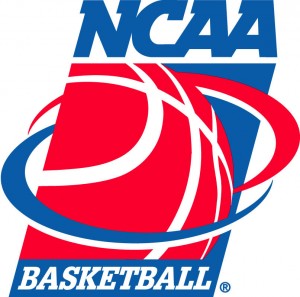 The Cornell men’s basketball team didn’t qualify for the NCAA basketball tournament this year. And our next nearest team, Syracuse University, was knocked out last weekend. Even still, much of the county will spend the next several weeks watching to see which college basketball team comes out on top this year. [Read more…]
The Cornell men’s basketball team didn’t qualify for the NCAA basketball tournament this year. And our next nearest team, Syracuse University, was knocked out last weekend. Even still, much of the county will spend the next several weeks watching to see which college basketball team comes out on top this year. [Read more…]
Evidence-based basketball, redux
More evidence on exercise
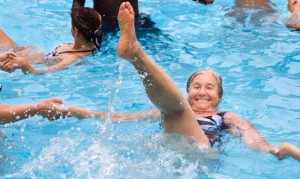 Last week, we discussed the evidence on using exercise to treat depression. This week, there is a new review on the benefits of exercise – this time to treat heart disease. [Read more…]
Last week, we discussed the evidence on using exercise to treat depression. This week, there is a new review on the benefits of exercise – this time to treat heart disease. [Read more…]
Does exercise help alleviate depression?
 If I come home in a bad mood, my husband usually suggests I head out for a run or over to the pool for a swim. That’s because he knows that exercise helps to improve my frame of mind. But does it also help improve the symptoms for people suffering from clinical depression? [Read more…]
If I come home in a bad mood, my husband usually suggests I head out for a run or over to the pool for a swim. That’s because he knows that exercise helps to improve my frame of mind. But does it also help improve the symptoms for people suffering from clinical depression? [Read more…]
An update on barefoot running
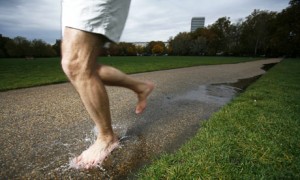 Here on EBL, we’ve written before about the trend of barefoot running and minimalist running shoes. Last week, the American College of Sports Medicine held its annual conference. There, researchers presented five separate studies on the benefits of running barefoot or with minimal footwear. [Read more…]
Here on EBL, we’ve written before about the trend of barefoot running and minimalist running shoes. Last week, the American College of Sports Medicine held its annual conference. There, researchers presented five separate studies on the benefits of running barefoot or with minimal footwear. [Read more…]
Evidence-based sports: Are winning streaks real?
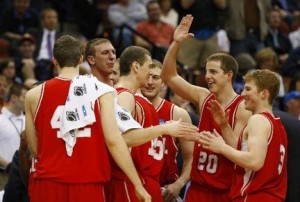 Over the years, EBL readers have appreciated our occasional reports on scientific evidence on popular sports. Indeed, during Cornell’s epic run for the NCAA tournament, we reviewed very interesting research on the “hot hand” in basketball, one of our most viewed posts. We’ve also written about other factors that determine a team’s success and the science of the Olympics. [Read more…]
Over the years, EBL readers have appreciated our occasional reports on scientific evidence on popular sports. Indeed, during Cornell’s epic run for the NCAA tournament, we reviewed very interesting research on the “hot hand” in basketball, one of our most viewed posts. We’ve also written about other factors that determine a team’s success and the science of the Olympics. [Read more…]
Football frets: The evidence on repetitive head injuries
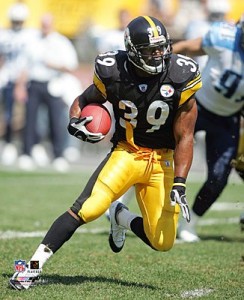 With football season underway, many Americans are spending their weekends cheering on their favorite teams at stadiums and tuning in to watch televised games. Personally, I enjoy following my college football team. But I always feel a sense of dread when a player takes an especially hard hit.
With football season underway, many Americans are spending their weekends cheering on their favorite teams at stadiums and tuning in to watch televised games. Personally, I enjoy following my college football team. But I always feel a sense of dread when a player takes an especially hard hit.
It turns out, those repeated hits add up to some real neurological problems for football players.
A study published this week in the journal Neurology followed nearly 3,500 football players who played at least five seasons in the N.F.L. from 1959 to 1988.
Over the course of the study, 334 of the players died. When researchers from the National Institute of Occupational Safety and Health reviewed their death certificates, they found Alzheimer’s disease was an factor in seven of the deaths and Lou Gehrig’s disease was a factor in seven others. These rates are more than three times what you would expect to see in the normal population.
This new study is part of a growing body of research on the neurological repercussions of repeated head injuries. Another study published earlier this year found repetitive head impacts over the course of a single season may negatively impact learning in some collegiate athletes.
And a center at the Boston University School of Medicine has documented evidence of a condition called Chronic Traumatic Encephalopathy, or CTW, a progressive degenerative disease of the brain found in people with a history of repetitive brain trauma.
The N.F.L. is investing in more research. This week, the organization donated $30 million to the National Institutes of Health for research on the connection between brain injuries and long-term disorders. That’s a good thing, because this is one topic we need more evidence on.


